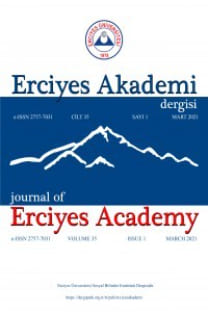İNGİLTERE SHEFFIELD BÖLGESİ DİJİTAL BECERİ EYLEM PLANI İNCELEMESİ VE TÜRKİYE İÇİN ÇIKARIMLAR
Eurostat 2019 yılı raporuna göre Türkiye’deki 16-74 yaş arası nüfusun %64’lük kesimi dijital dünyadan yararlanmak, ona katılmak ve katkıda bulunmak için gerekli temel becerilere sahip değildir. Ayrıca Türkiye bu sonuçlarla 34 Avrupa ülkesi içinde 30.sırada yer almaktadır. Gelen dijitalleşme dalgasının ekonomiler üzerindeki etkisi düşünüldüğünde, en büyük ilk 20 ekonomi arasında (GSYH-2019’a göre) yer alan Türkiye’nin gelecekte rekabet gücünü kaybedebileceğine dair önemli bir sinyal olarak okunmalıdır. Bu çalışmada “Türkiye’de dijital becerilerin geliştirilmesine dönük neler yapılabilir?” ana sorunsalı İngiltere-Sheffield bölgesinde gerçekleştirilen dijital beceri eylem planı örneğinde tartışılmıştır. Böylece Türkiye’deki dijital beceri düzeyinin yükseltilebilmesi için uygulanabilir bir yol haritası oluşturmak hedeflenmiştir. Nitel araştırma tekniklerinin kullanıldığı araştırmanın sonucunda bireyler arasında dijital becerilerin geliştirilmesinde uygulanabilecek 12 maddeye yer verilmiştir. Bunlar arasında özellikle veriyi analiz edebilme, anlamlandırma ve buradan yeni iş modelleri çıkarabilme aşamaları gibi dijital rollerin hedef kitleye kazandırılması öne çıkmaktadır. Bu noktada, dijital beceri geliştirme programının dezavantajlı gruplar dahil her kesimden insanı içine alacak şekilde planlanması gerekmektedir. Ayrıca hedeflerin başarılı olabilmesinde tüm aktörlerin (üniversite, özel sektör ve kamusal birimler) süreci sahiplenmesinin ve katkı sunmasının önemi ortaya konulmuştur.
Anahtar Kelimeler:
Dijital Beceriler, İngiltere-Sheffield Dijital Beceri Eylem Planı, Endüstri 4.0.
ENGLAND-SHEFFIELD REGION DIGITAL SKILLS ACTION PLAN REVIEW AND INFERENCES FOR TÜRKİYE
According to the Eurostat 2019 report, 64% of the population aged 16-74 in Türkiye do not have the basic digital skills. In addition, Türkiye ranks 30th among 34 European countries in terms of digital skills. This result is very important as it contains strong signals that Türkiye, among the top 20 economies on a global scale (according to GDP-2019), may lose its competitiveness. This study aims to create an applicable roadmap for increasing the level of digital skills of Türkiye. For this purpose, the main question, What can be done to develop digital skills in Türkiye?, was discussed in the example of the UK-Sheffield region. As a result of the field research, in which qualitative research techniques were used, 12 topics that can be applied to develop digital skills among individuals were included. Among these, it is important to bring digital roles to the target audience, especially data analyzing, making sense of data, and creating new business models from it. At this point, the digital skills development program should be planned to include people from all walks of life, including disadvantaged groups. In addition, the importance of participation and contribution of all actors (universities, private sectors and public units) to the digital skills development process in order for the targets to be successful has been demonstrated.
___
- Acemoglu, D. & Zilibotti, F. (2001). Productivity differences. The Quarterly Journal of Economics, 116(2), 563-606.
- Acemoglu, D. & Restrepo, P. (2020). Robots and jobs: evidence from US labour markets. Journal of Political Economy, 128(6), 2188-2244.
- Acemoğlu, D. (2019, Mayıs, 05). Why we need to think of AI as a platform. The Institute for New Economic Thinking konuşması. https://www.youtube.com/watch?v=mnAlseMLkUI.
- Aksoy, S. (2022). Endüstri 4.0’ın doğrudan yabancı sermaye yatırımları üzerindeki etkileri: ampirik çalışma ve Türkiye ekonomisi için çıkarımlar (Yayımlanmış doktora tezi). Marmara Üniversitesi Sosyal Bilimler Enstitüsü.
- Carretero, S., Vuorikari, R. & Punie, Y. (2017). DigComp 2.1: the digital competence framework for citizens with eight proficiency levels and examples of use. Publication Office of the European Union.
- Curtarelli, M., Gualteri, V., Shater J. M. & Donlevy, V. (2017). ICT for work: digital skills in the workplace. Publication Office of the European Union.
- Etzkowitz, H. & Leydesdorff, L. (2000). The dynamics of innovation: from national systems and "mode 2" to a triple helix of university industry government relations. Research Policy, 29(2), 109–123.
- Eurostat (2019, Temmuz). Individuals' level of digital skills. Eurostat Databrowser, https://ec.europa.eu/eurostat/databrowser/view/ISOC_SK_DSKL_I/default/table?lang=en.
- Freeman C. & Soete, L. (2003). Yenilik iktisadı (Çev. E. Türkcan). TÜBİTAK Yayınları Akademik Dizin.
- Graham, W. (2016). Digital literacy (dl): establishing the boundaries and identifying the partners. New Review of Academic Librarianship, 22(1),1-4.
- Hancock, R.D. & Algozzine, B. (2006). Doing case study research. Teachers College Press.
- House of Commons (2016). The digital economy: second report of session 2016-17. https://publications.parliament.uk/pa/cm201617/cmselect/cmbis/87/87.pdf.
- Karataş, Z. (2015). Sosyal bilimlerde nitel araştırma yöntemleri. Manevi Temelli Sosyal Hizmet Araştırmaları Dergisi, 1(1),62-80.
- Law, N., Woo, D. & Wong, G. (2018). A global framework of reference on digital literacy skills for indicator 4.4.2. UNESCO Institute for Statistics (UIS), Report number: UIS/2018/ICT/IP/51.
- Lorenz, M., Rüßmann M. & Waldner, M. (2015). Industry 4.0: the future of productivity and growth in manufacturing industries. BCG Publication.
- McGuinness, S., Pouliakas, K. & Redmond, P. (2019). Skills-displacing technological change and its impact on jobs: challenging technological alarmism?. IZA Discussion Papers, No. 12541, https://www.econstor.eu/bitstream/10419/207367/1/dp12541.pdf.
- Ranga, M. & Etzkowitz, H. (2013). Triple helix systems: an analytical framework for innovation policy and practice in the knowledge society. Industry and Higher Education, 27(4),237-262.
- Sheffield Digital Skill Plan (2019). Sheffield city region digital skill action plan. https://www.sheffielddigitalskills.org.uk/.
- Schober, K. S. (2017). Industry 4.0 – challenge for the f&b industry in Turkey, advantage or competitive disadvantage?.https://new.siemens.com/de/de/unternehmen/themenfelder/partner/industrie/review- events.html.
- Schumpeter, J.A. (1966), Kapitalizm, sosyalizm ve demokrasi, Varlık Yayınları.
- Segal Quince Wicksteed Partnership (2018). Sheffield city region digital skill action plan: the evidence report. https://sqw.co.uk/services/strategy-action-planning.
- Türkiye Bilimsel ve Teknik Araştırma Kurumu (2016). Yeni sanayi devrimi, akıllı üretim sistemleri, teknoloji yol haritası. TÜBİTAK Yayınları.
- Türk Sanayiciler ve İş İnsanları Derneği (2016). Türkiye’nin küresel rekabetçiliği için bir gereklilik olarak sanayi 4.0: gelişmek olan ekonomi perspektifi. TÜSİAD Yayınları.
- Vuorikari, R., Punie, Y., Carretero S. & Van den Brande, G. (2016). DigComp 2.0: the digital competence framework for citizens. update phase 1: the conceptual reference model. Publication Office of the European Union.
- Yayın Aralığı: Yılda 4 Sayı
- Başlangıç: 1987
- Yayıncı: Erciyes Üniversitesi
Sayıdaki Diğer Makaleler
PİET MONDRİAN VE SANATININ TEOZOFİ FELSEFESİ İLE OLAN İLİŞKİSİ
MUHAMMED GAZZÂLÎ’NİN ESERLERİNDE KONULU TEFSİR
ALPAMIŞ DESTANI’NIN VARYANTLARINDA ZALİM HÜKÜMDARIN ETNİK KİMLİĞİ MESELESİ
ÇEVRİMİÇİ YABANCI DİL SINIFLARINDA DİL ALAŞIMI: ÖĞRENCİ ALGILARI
ÖĞRETMENLERİNE GÖRE SEÇMELİ KUR’AN-I KERİM DERSİNİN SORUNLARI
LÜKS MODA MARKALARININ SANATLA KONUMLANDIRMA STRATEJİSİ VE LOUIS VUITTON ANALİZİ
